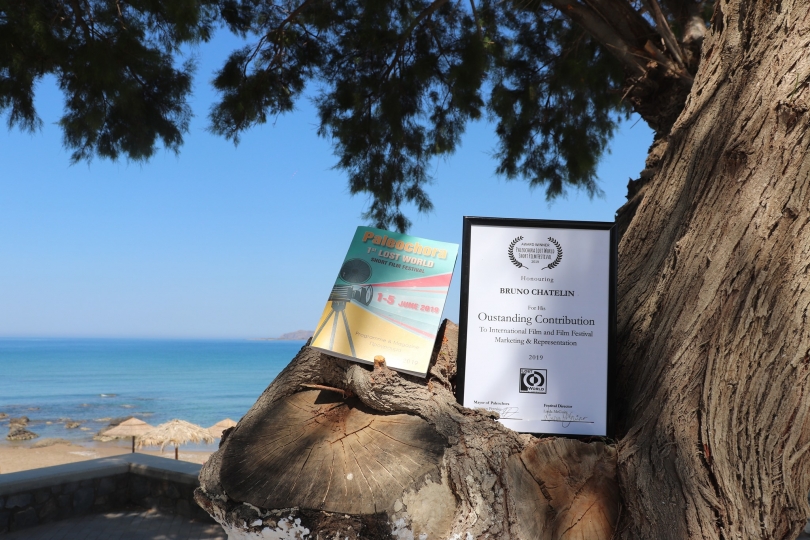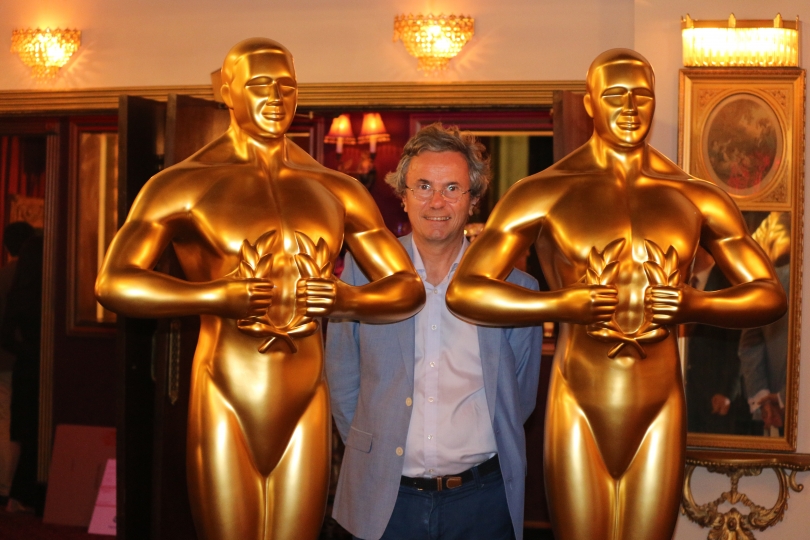|
|
||
|
Pro Tools
FILMFESTIVALS | 24/7 world wide coverageWelcome ! Enjoy the best of both worlds: Film & Festival News, exploring the best of the film festivals community. Launched in 1995, relentlessly connecting films to festivals, documenting and promoting festivals worldwide. We are sorry for this ongoing disruption. We are working on it. Please Do Not Publish until this message disappears. For collaboration, editorial contributions, or publicity, please send us an email here. User login |
Editor
THE NEWSLETTER REACHES 171 000 FILM PROFESSIONALS EACH WEEK (december 2023) .Share your news with us at press@filmfestivals.com to be featured. SUBSCRIBE to the e-newsletter.
MEET YOUR EDITOR Bruno Chatelin - Check some of his interviews. Board Member of many filmfestivals and regular partner of a few key film events such as Cannes Market, AFM, Venice Production Bridge, Tallinn Industry and Festival...Check our recent partners. The news in French I English This content and related intellectual property cannot be reproduced without prior consent.  New York: 2011 Jewish Film Festival
In its 20th edition, the New York Jewish Film Festival presented 36 features and shorts from 14 countries; 31 premiered in New York. As in past years a balanced program provided perspectives on the Jewish experience and included several outstanding productions on the holocaust period and its aftermath.
In LILITH (Eytan Harris, ISRAEL, 2010), a documentary; prejudices and resentments are revealed when a mother insists that her child be cremated rather than having a religious burial. Antagonism by the small community she lives in is reinforced because the daughter committed suicide and Lilith pursued an alternative life style. Although secular authorities side with her and permit cremation; ZAKA, the Jewish ultra-orthodox organization controlling the death industry in Israel, tries to confiscate the body. ZAKA eventually stages a second burial with her daughter's ashes. LILITH depicts a microcosm of Israeli society reflecting, the conflict between secular and religious orientations, and the shunning of those who are different from the 'norm'. Jonathan Gruber directed JEWISH SOLDIERS IN BLUE AND GREY (USA, 2011), the first film on the role of Jews during the American civil war. This noteworthy documentary depicted the 10,000 Jews (out of 150 000 living in the US) who fought on both sides during the American civil war. The film covers their success in proving their worth as Jewish Americans and overcoming generalized prejudice and anti-Semitism. Unfortunately, the presentation and focus is marred by too many interviews and an overbearing musical score. The spirit of the times is reflected in Ulysses S. Grant's order to expel on short notice all the Jews in the region he controlled. Although over ridden by Lincoln, Grant is never actually reprimanded. BLACK BUS (Anat Yuta Zuria, 2009) is a revealing work. This is a very personal yet effective documentary by a writer and an independent photographer who were banned by their Haredi ultra orthodox communities for desiring normal lives. Their depiction of gender apartheid is shown through videotaping segregated bus sections on public transportation in the Haredi sector of Jerusalem. In this area of Jerusalem the front of a bus is taken by men and more often than not, the back of the bus is overcrowded with women. For the ultra orthodox men, women do not exist other than serving as objects. The presentation is intriguing because it is a unique documentary record of women's lives in the Haredi community which is rarely if ever presented otherwise. As one fanatic man argues on the bus, "women who do not conform to tradition are not healthy". Another documentary, the Australian 2009 production, WRONG SIDE OF THE BUS by Rod Freedman deals with a related issue. It is the biographical excursion of a doctor returning after four decades to his medical school reunion in his homeland South Africa. He must face guilt at having been raised Jewish and privileged in a racist society. Bringing his grown up son; he explores his past and suffers in the quest for reconciliation from his past political failure. The cynical son comes across as being more in touch with reality while the father's alleged dilemma is shown in a subdued but not very convincing fashion. THE HUMAN RESOURCE MANAGER by Eran Riklis (Israel/Germany/ France/ Romania, 2010) is an audience pleasing production. This is a well executed and entertaining feature film about a bakery executive from Jerusalem. The story presents his effort to bury the corpse of a Rumanian employee killed in a suicide bombing in Israel in her home country and demonstrates his struggle to overcome personal, bureaucratic, political and cultural obstacles.
As in past years, the film festival screened again several productions providing new insights into the holocaust. EICHMANN'S END: LOVE, BETRAYAL, DEATH (Raymond Ley, Germany/Israel, 2010 ) is a reconstruction of Eichmann's a capture using archival material, interviews with his widow, interviews the few witnesses who knew Eichmann in Latin America and dramatic reenactments. The film is in part based on lengthy interviews which Eichmann gave to a journalist, and includes the romance of Eichmann's son with the daughter of a concentration camp survivor who succeeded in identifying Eichmann. Overall, the Eichmann reconstruction was interesting though hardly outstanding. However, two films from France on the Holocaust proved exceptional.
Interest and research into the Jewish past persist, and the holocaust and its context continue to provide an unending source for projects. Investigation of the holocaust's murderous events and aftermath seem to generate unrelenting new knowledge. Thus, more than sixty years after World War II, archives revealing their secrets have been opened after persistent pressure from journalists and scientists. Over the last two months we have learned that in the 60's Klaus Barbie was on the pay role of the German Gehlen organization (or Bundesnachrichtendienst) having been employed earlier by US agencies. We've also learned that the West German secret service knew as early as 1952 the whereabouts and identity of Adolf Eichmann, without passing this information onto the Mossad. Furthermore, a recently completed study of the German Foreign service during and after the Third Reich revealed that Nazi diplomats actively participated in the holocaust, and that these diplomats were protected by the legal department of the same Foreign Service after the war. The New York Jewish Film Festivals has consistently incorporated documentaries which illuminate the holocaust. This year two films were featured presenting the active role of the French state railroad system (SNCF) and the French police in sending Jews and other French citizens to the death camps.
These documentaries, CONVOYS OF SHAME and THE ROUND UP, provide stunning insights into the extermination of the French Jewish community and the supportive role of French governmental agencies. Without the active support of SCNF functionaries and of the French police, the murders of thousands of Jewish civilians would not have been possible. It is significant that the French collaborators sent not only Jews to their certain death in the Eastern European death camps, but also thousands of French resistance fighters. By the spring of 1942 185,000 conscripted laborers from France had reached their German destination on SNCF trains. Judging from the visual material in both documentaries, the ever present Wehrmacht rarely intervened and stayed mostly in the background while French uniformed services carried out their assignments. According to the on-line encyclopedia of mass violence, none of the French officials responsible for rail transport to Germany or for the round up of Jews were ever brought to trial.
CONVOYS OF SHAME (Raphael Delpart, France, 2010) covers superbly the role the French national railroads played in World War II during the German occupation.. While high raking German Nazi civilians from the police and Reichsbahn provided instructions to their willing counterparts from the French railroads and other civilian authorities, the anti-Semitic laws and regulations adopted by the Vichy regime were applied to all of France. The SNCF authorities faithfully carried out German commands, with senior SNCF executives apparently submitting to German authorities on a voluntary basis. Since the SNCF was paid by the Germans on the basis of the number of passengers shipped as multiplied by the number of kilometers travelled, the SNCF decided to use cattle cars to maximize profits. The SNCF actually billed the liberated French state for the last shipments carried out from areas about to be left by the German military. Certainly, French rail road workers formed part of the resistance against German military transports and troops, but according to CONVOYS OF SHAME there was virtually no sabotage of the trains carrying innocents to their deadly destination. The documentary identifies only one train engineer who refused to drive his train once made aware of the freight and destination. The administrators of the SNCF fully cooperated with the Germans, though by 1943 the existence of gas chambers and the murder of millions were well known. After the war, SNCF workers and management claimed credit for being part of the resistance. This followed the official view of France; that Vichy rather than FRANCE collaborated with the Germans. It took France fifty years to acknowledge collaboration, when President Jacques Chirac apologized in July of 1995 for the role France played in the suffering of the Jewish people. Eleven more years passed before a Toulouse court found the French state and the SCNF guilty of collaborating with the Germans and deporting Jews to the death camps. On January 26, 2011, the SNCF apologized for 20,000 French Jews shipped to the concentration camps. This apology was apparently prompted by several members of Congress trying to bar the SNCF from competing for lucrative high speed railway projects in the U.S.
In a most original and thorough film Roselyn Bosch provides in THE ROUND UP a 2010 co-production of France, Germany and Hungary a compelling presentation of collaboration. This feature length documentary reconstructs the round up of 13,000 Jewish women, man and children, mostly families, from the Paris area to the Velodrome d'Hiver. The sports arena was the staging ground for their transfer to French detention camps and subsequent transport the Auschwitz extermination camp. On virtually all grounds, THE ROUND UP is an outstanding production. Be it acting, script, photography or the extraordinary set reconstruction of the Montmartre neighborhood, the Velodrome d'Hiver and the concentration camps THE ROUND UP excels. More than 9000 extras were part of the film, and numerous well known actors such as Melanie Laurent, Jean Reno, and Gad Elmalegh starred in it. The director succeeded in extracting superb performances from all, especially the children who played such a crucial part.
Equally important is the relevance and likely impact of the film. As a solid investigation of a shameful chapter of French history, the film has also been screened on French public television and is now widely used in the French educational system. THE ROUND UP has become essential for coming to terms with the French past. When released it also took the first place on the box office, a surprising commercial success revealing a stark shift from denying French responsibilities. This reconstruction of the past also scores high marks for the film maker's extensive and painstaking three years of research. This research provided the reality basis for virtually all the sequences shown. Of the 13,000 Jews assembled in the velodrome only 25 survived. Rose Bosch was able to find two individuals from that group who were still living and used her research and their recollections to build her story. The dialog in the encounters between Vichy and other French officials and their German counterparts was reconstructed using archival documents and telex traffic between Paris and Berlin. This has resulted in the superb reenactment of real life stories, characters, and political exchanges. The film is a professional masterpiece avoiding melodramatic touches and exaggerations.
I trust that that the New York Jewish film festival brings similar high quality work in the future.
Claus Mueller
10.02.2011 | Editor's blog Cat. : Adolf Eichmann Adolf Eichmann Berlin Bibliography of The Holocaust Blood for goods Business Business Claus Mueller Congress Contact Details Director Disaster Disaster engineer Entertainment Entertainment Eran Riklis executive film maker filmexchange@gmail.com France French police Gad Elmalegh German military Germany Harris Human Interest Human Interest Human Resource Manager Hungary Israel Jacques Chirac Jean Reno JÉRUSALEM Jewish history Jonathan Gruber Journalist Labor Labor Latin America Law Law Ley Lincoln Mélanie Laurent Mossad Mossad New York New York Paris Person Career Person Location Photographer president Rail transport in Europe Raphael Delpart Religion Religion Responsibility for the Holocaust Rod Freedman Romania Rose Bosch Roselyn Bosch SNCF South Africa Technology Technology The Holocaust the New York Jewish Film Festival The New York Jewish Film Festivals The sports arena transportation Ulysses S. Grant United States Universal jurisdiction Vichy France War War Western Asia writer FESTIVALS
|
LinksThe Bulletin Board > The Bulletin Board Blog Following News Interview with EFM (Berlin) Director
Interview with IFTA Chairman (AFM)
Interview with Cannes Marche du Film Director
Filmfestivals.com dailies live coverage from > Live from India
Useful links for the indies: > Big files transfer
+ SUBSCRIBE to the weekly Newsletter DealsUser imagesAbout Editor Chatelin Bruno Chatelin Bruno (Filmfestivals.com) The Editor's blog Be sure to update your festival listing and feed your profile to enjoy the promotion to our network and audience of 350.000. View my profile Send me a message The EditorUser pollsUser contributions |





























